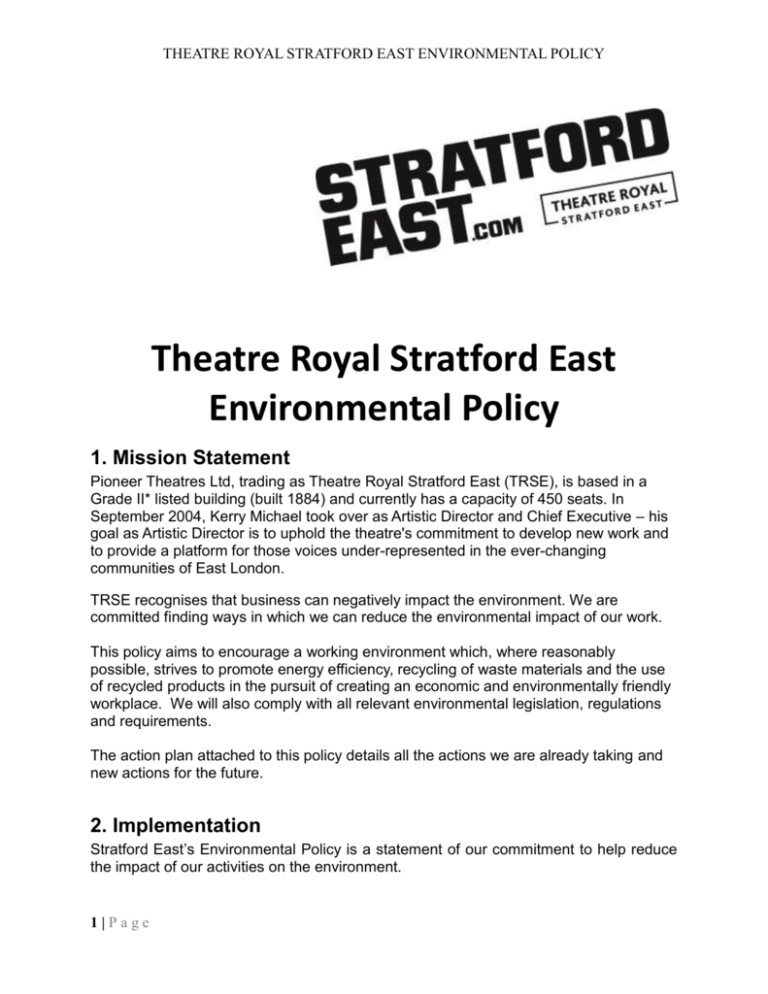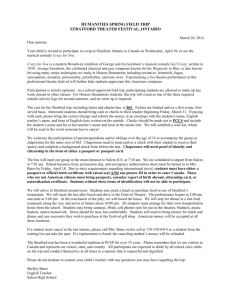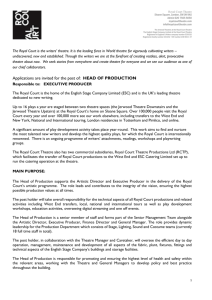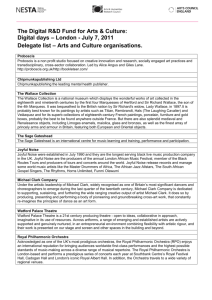Environmental Policy
advertisement

THEATRE ROYAL STRATFORD EAST ENVIRONMENTAL POLICY Theatre Royal Stratford East Environmental Policy 1. Mission Statement Pioneer Theatres Ltd, trading as Theatre Royal Stratford East (TRSE), is based in a Grade II* listed building (built 1884) and currently has a capacity of 450 seats. In September 2004, Kerry Michael took over as Artistic Director and Chief Executive – his goal as Artistic Director is to uphold the theatre's commitment to develop new work and to provide a platform for those voices under-represented in the ever-changing communities of East London. TRSE recognises that business can negatively impact the environment. We are committed finding ways in which we can reduce the environmental impact of our work. This policy aims to encourage a working environment which, where reasonably possible, strives to promote energy efficiency, recycling of waste materials and the use of recycled products in the pursuit of creating an economic and environmentally friendly workplace. We will also comply with all relevant environmental legislation, regulations and requirements. The action plan attached to this policy details all the actions we are already taking and new actions for the future. 2. Implementation Stratford East’s Environmental Policy is a statement of our commitment to help reduce the impact of our activities on the environment. 1|Page THEATRE ROYAL STRATFORD EAST ENVIRONMENTAL POLICY The policy is supported by an Environmental Action Plan which specifies how the policy will be implemented, complete with targets, dates and a named person responsible for delivering it. Working with our staff, artists and audience we aim to consider and communicate the environmental impacts of our activities. For each financial year we will assess and report our environmental performance to stakeholders. This information will be used to update our action plan for the coming year. We aim to regularly review our Environmental Action Plan and seek to reduce our impact by setting carbon reduction targets. 3. Scope of Policy Our activities have environmental impacts in the areas of: Energy Water Waste Travel Materials Our ability to improve our environmental impacts depends on our knowledge of, and commitment to addressing them and our capacity to change and influence decisions. We are fully responsible for utility contracts and therefore we will exert our efforts as much as possible to understand; measure; improve; and communicate our environmental performance. 4. Key Environmental Impacts 4.1 Theatre Building The main impacts from our building are from electricity and gas consumption. Our consumption of electricity and gas is similar, but electricity is more than twice as carbon intensive. Primary environmental impacts are: Fossil-fuel energy consumption Water consumption Waste generation Office supplies and services (see 4.5.1 and 4.5.2) 4.2 Business Travel and Staff Commuting We have a limited control over our staff commuting habits, but we have very limited onsite parking and are well connected by public transport links. We also encourage cycling by facilitating bike storage and offering the government’s tax relief scheme on buying bikes. We rarely tour or work with international artists and generally employ artists 2|Page THEATRE ROYAL STRATFORD EAST ENVIRONMENTAL POLICY locally so our environmental impacts are limited in this respect. We do have full control over our employees business travel and encourage the use of public transport wherever possible. Our business travel impacts are relatively small, most travel is associated with our Artistic Director. Primary environmental impacts are: Fossil fuel energy consumption 4.3 Stakeholder travel (i.e. audience) We are well serviced by public transport links - therefore this should provide a good incentive to encourage people to use public transport to attend our shows. Primary environmental impacts are: Fossil fuel energy consumption 4.4 Productions Our productions and events may involve the use of materials for staging and/or props. They may also involve the use of lighting and sound. Primary environmental impacts are caused by: Fossil fuel energy consumption Waste generation Use of materials e.g. wood, steel Toxicity of batteries 4.5 Goods and Services Procurement 4.5.1 Office Supplies A few goods and services are procured to run our office operations and each has an environmental impact. Primary environmental impacts are caused by: Resource use for office electronic equipment, furniture and stationery Toxicity of cleaning products, furniture and equipment 4.5.2 Other In addition to the goods and services outlined above, two less visible areas for consideration are: Banking Server hosting of the website and email accounts 3|Page











